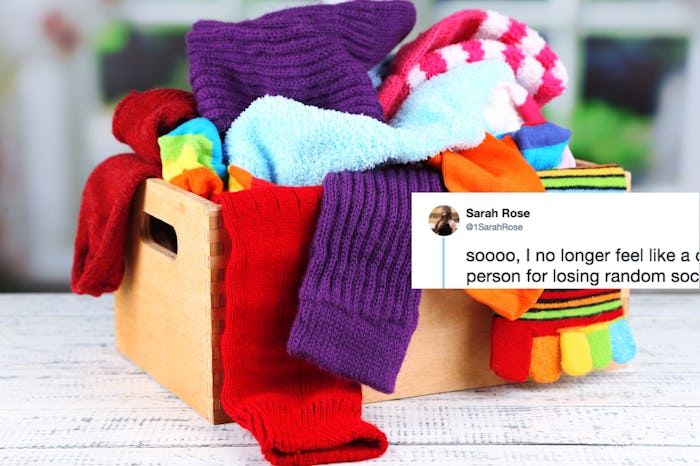News
Now We Know Where All Those Socks Actually Go When You Do Laundry, Thanks To This Viral Photo
No matter how meticulous you are about gathering and sorting your laundry, eventually, you're going to end up with missing socks. It's one of the great mysteries of life. Like all of the other things you never thought you needed to know, we now might finally know where all of those missing socks go after you do laundry, thanks to a Twitter user who shared a picture of their washing machine.
Twitter user Sarah Rose posted an image of a washing machine with a bottom compartment opened up and oodles of socks spilling out of it. Like, there were a bazillion socks in there. The image was originally posted to Bored Panda by Cathy Hinz, who explained that she and her husband were property managers of a building with a laundry room that was giving them issues. According to Bored Panda, Hinz wrote, "Today, my husband got tired of fooling with one of the washing machines that was just not working properly and decided to take it apart, starting with the bottom panel. To his shock, this is what he found."
Dozens and dozens of solo socks. Hinz added, "For those of you that swear your machine eats your small things … here is the proof!” It really is pretty shocking. But can a washing machine actually "eat" your socks?
James Darmstadt, a quality engineer at GE Appliances, told TODAY that he wasn't surprised at all. He noted that in this particular picture, it looks like there was a hole in the gasket, or the "thick, rubber ring on front-loading washers that creates a tight seal when the door closes." He added that the amount of socks in this building's washer probably took a few years to accumulate, but that it can be happening in your laundry room, too.
Darmstadt recommended, according to TODAY, "While cleaning, feel the surface and look for any tears or holes. Tears, slits, holes would be bad. This could lead to disappearing socks as well as water leaks." It can also happen in top loading washers, too, if you throw too much in and the socks make it to the very outer edge then get caught between the side of the machine and the basin that spins around. It's all in the loading — if you add too many clothes, it's more likely that your socks, or smaller items, will end up overflowing into that tiny abyss in your washer.
Another Twitter user helpfully replied to the tweet with another quick fix:
For the folks seeing this who by (small) chance see my reply, check the duct that comes out of the back of the dryer, often a white, large, Slinky-like tube. Comes off and on incredibly easily. Socks, stuff from your pockets, etc. Cleaning it will dry your clothes faster, too.
Still, another Twitter user suggested that the original picture had to be staged, since if there were that many socks creeping in through the gasket, the washer would have been leaking water or not working well. Although, that was why the original poster's husband checked the machine in the first place, so it could go either way.
Then again, it might not be the machines at all. According to 2015 research from Samsung UK, a lot of missing socks probably aren't missing at all. Their researchers found that depending on the size of a household, people will point fingers at the person in charge of loading and unloading the laundry for not doing it properly and then losing track of a sock.
Or, since we're humans, we tend to look for lost things in the last place we saw them. So we check the washer or dryer for a lost sock, when really, it's stuck in the pant leg of those skinny jeans we couldn't wait to get off the other night or it was flung under the bed by accident while picking laundry up the floor.
Either way, it's worth giving your appliances a check, whether it's the dryer or the washer. Then check in the back of the closet in your kids' room. The sock monster is apparently everywhere.
Check out Romper's new video series, Bearing The Motherload, where disagreeing parents from different sides of an issue sit down with a mediator and talk about how to support (and not judge) each other’s parenting perspectives. New episodes air Mondays on Facebook.
